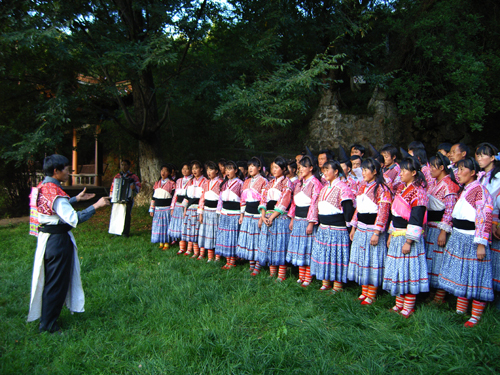Society
Christian group sings songs of their faith
By Guo Shuhan (China Daily)
Updated: 2010-02-23 07:36
 |
Large Medium Small |
Miao minority choir's religious performances win national praise
FUMIN, Yunnan: Only a small shabby chapel is brilliantly illuminated in the dark and tranquil night of Xiaoshuijing Miao minority village. Songs in chorus for four parts penetrate the darkness and can be heard from afar.
 Singers from the Xiaoshuijing Miao minority village choir in Fumin county, Yunnan province, perform in this file photo. |
The melodies are sung by the choir, which was formed by the villagers 70 years ago. For many generations, the choir's singing has resounded in the remote mountains.
Xiaoshuijing village is located in Fumin county, which is 32 km away from Kunming, Yunnan province. Sitting in a barren mountainous area more than 2,300 meters above sea level, 150 households are scattered within a 3.5 sq km area.
Among 447 villagers, some 80 percent are Christians. Although few of them understand the Bible thoroughly, the religious belief nonetheless has nevertheless been passed down for four generations.
The area suffers from a shortage of water and electricity, and the people eat mainly potatoes and corn. The highest education level is junior high school and the area has no Internet connection to the outside world. The people here dedicate their time basically to farm work and attending religious services.
During the "cultural revolution" (1966-1976), all Bibles were burned and the church services were banned. Yet few locals changed their firm Christian beliefs.
Every Wednesday and Saturday evening and Sunday, the villagers go to the chapel to listen to the singing. Other evenings, members of the choir rehearse in the chapel, chanting their reverent love and devotion to their God. Even swaddled babies are carried by their parents.
"I feel spiritual contentment," said Long Guangyuan, the third-generation conductor of the choir.
Like other villagers, the conductor is always wearing shoes caked with fresh mud and those same shoes last him for years.
"All unpleasantness falls away in a moment when I sing or pray with others in the chapel," Long said.
Miao minority can be divided into more than 40 branches. People in Xiaoshuijing belong to the Dahua branch, who mainly reside in the mountainous area on the borderland among southwestern Yunnan, Sichuan and Guizhou provinces.
Owing to their harsh natural environment, the Dahua branch is one of China's most underdeveloped, even in the present.
"Nearly two-thirds of people of our Dahua branch believe in God. Worshippers of other branches account for merely 10 percent," says Pan Xuewen, founder of Yunnan Miao Christianity website, which gives the history and contemporary development of the religion in the Miao minority.
"We were discriminated against by other surrounding minorities and the Han ethnic group in the past. But Christian missionaries built schools for us and comforted us in spirit. What missionaries preached brought us spiritual encouragement."
Travel to the area was difficult and dangerous in the old days and people from outside the country actually had an easier time traveling to the area people than from inside China.
In 1881, British missionary Samuel Pollard arrived in Miao minority district in Dali via Burma. Pollard helped the Miao people to establish their own language and built a primary school and medical clinic. Hymns with four parts (soprano, alto, tenor and bass) were taught as well.
Christianity was introduced to Xiaoshuijing village, 134 km away from Dali, by Australian missionary Guo Xiufeng 55 years later.
Long Xixue, 98, the oldest resident in the village, can still remember when Guo arrived.
"He was a tall foreigner, who rode a horse with a patch of color," he recalled.
Long is still grateful to Guo for changing local people's backward living habits and beliefs that were based on superstitions. Despite moving very slowly, Long still attends the service every Sunday.
The illiterate senior hums two lines of hymns in the Miao language devoutly every Sunday. The mere two lines clearly embedded in his faint recollection means "calling on the Miao people to return to the path of rectitude".
Seven years ago, the choir's singing was accidentally heard by Zhang Xiaoming, chief of Culture, Sports and Tourist Bureau of the county. Zhang was astonished by the farmers' professional singing skills.
He then organized the choir to participate in the first Chorus Festival of Chinese Western Regions in 2003. Their amazing bel canto skills and selected sophisticated pieces, which conquered and shocked the audience and judges, won them the gold medal.
"It's really hard to imagine how the farmers' chorus could handle such demanding chapters like Tzigane by German composer Robert Schumann," said well-known musician Xu Peidong. "And their healthy faces and clear eyesight move me."
They began to compete in other national competitions, letting the outside world learn about their pure and reverent singing, as well as their unconventional Christianity in this small village.
The choir was invited to perform in Christmas celebration in Macao in 2005 and 2009. They also participated in the National Center for the Performing Arts (NCPA) for the 2008 Musical Week for International Folk Songs.
"Winning prizes doesn't make sense to us," says Long Guangyuan. "As Christians, we take each performance as preaching the gospel. As long as we can sing, we feel quite satisfied."
The Miao people are not the only minority in China with a large number of Christians. Twenty-five other minority groups in Yunnan do as well.
According to Cao Minghuang, a staffer with the Yunnan Religious Affairs Administration, minority believers account for 80 percent of the total 400,000. Christians are spread throughout 126 of the 129 counties.
"In recent years, the provincial government has funded 10 million yuan annually to subsidize the maintenance and repair costs of the main places for activities of the five major religions - Taoism, Buddhism, Protestant Christianity, Catholicism and Islam," Cao said.
The Committee of the Three-Self Patriotic Movement of the Protestant Churches and the Christian Council of Yunnan have begun translating the Bible into minority languages.
Xiaoshuijing village is holding classes for Bible study during the Spring Festival.
Although the village is still poverty-stricken and the average annual income per person is at most 1,200 yuan ($175.68), they agree with the ruling elder: "If there was no Christianity, our development process would be much slower."







